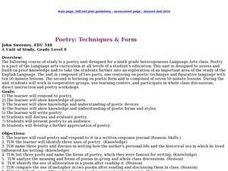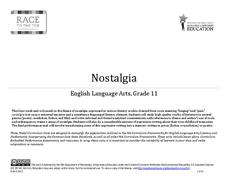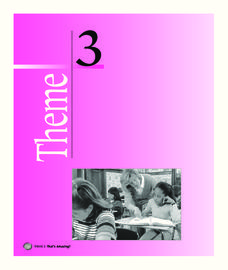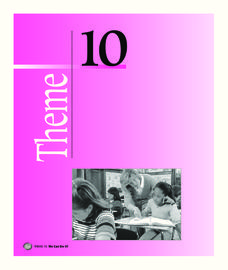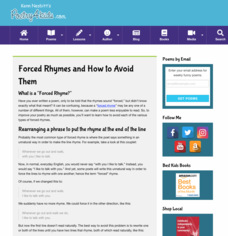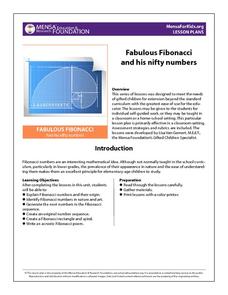Curated OER
Poetry: Techniques & Form
Ninth graders explore poetic technique and figurative language in this ten instructional activity unit. Comparisons are made between a variety of forms of poetic expressions and the lives of several poets are studied.
Curated OER
An Irritiating Creature - a poetry lesson
Students think about and evaluate the meaning of a poem. It also encourages students to be original and creative in their thinking as they read, analyze and illustrate their story.
Curated OER
Getting-to-Know-You List Poem
Learners construct a list poem. In this poetry lesson, students discuss their likes and dislikes and summarize their thoughts into a list poem.
Curated OER
Poet James Whitcomb Riley: Famous in His Own Day
An engaging biography of "Hoosier" poet James Whitcomb Riley serves as a springboard for study of his unique dialect-based verse. Several activities illuminate differences between spoken vernacular and formal language. Learners record...
Denver Art Museum
The Poetry in Non-Events
The photograph, Nellie and her Italian Soda is viewed and discussed by the class. They are instructed to use the photograph as inspiration to write a poem about non-events, or things that are beautiful in every day life. Pupils use...
Syracuse University
Harlem Renaissance
The music and literature of the Harlem Renaissance defined American culture, including its poetry. Using a poem from the period, individuals explore its musical qualities and how it is reflective of the period. Then, they use what they...
Massachusetts Department of Education
Nostalgia
To prepare for crafting their own memoir, class members examine poetry by Margaret Atwood, Billy Collins, Robert Hayden, and Claude McKay, stories by Richard Rodriquez and Willa Cather, and Barry Levinson's film Avalon. They examine...
Trinity University Digital Commons
Romanticism: Past and Present
With its focus on nature, individualism, imagination, and rejection of traditional authority, Romanticism has great appeal to young high schoolers. After examining classic paintings and poems as well as current works, class members...
abcteach
Dragon Alliterations
You don't have to slay the dragon in this activity. Young writers review poetic devices with a set of worksheets about alliteration and similes. Once they finish waxing poetic about their dragon friends, they craft a final...
Houghton Mifflin Harcourt
That’s Amazing!: English Language Development Lessons (Theme 3)
That's Amazing! is the theme of an English language development unit created by Houghton Mifflin. Following a speak, look, move, and listen routine, scholars delve into topics; seasons, weather, animals, landforms, telling...
Scholastic
Lesson Two: The Earth, Introductory Activities
Determine what young pupils already know about earth science with a brainstorming activity. After class members work together to complete a KWL chart about the Earth, they craft an acrostic poem to demonstrate their understanding.
Houghton Mifflin Harcourt
Around Town: Neighborhood and Community: English Language Development Lessons (Theme 3)
Here is a unit designed to support English language development. Scholars speak, move, and write to learn more about topics that focus on community and local concepts. The series of lessons aids to reinforce concepts...
Facing History and Ourselves
Identity and Place
Build scholars' ability to understand their own values and learn about World War II at the same time. Scholars write poetry and discuss identity and place in depth with an in-depth social studies resource.
K5 Learning
Rhyming Animals
Second graders read an informational text passage on animals, as well as a poem that incorporates rhyming words. Then, 2nd graders answer questions based on what they read.
Houghton Mifflin Harcourt
We Can Do It!: English Language Development Lessons (Theme 10)
English language development lessons are brought to you in poems, picture cards, and grand discussions in a We Can Do It! themed unit. Topics of discussion include daily challenges, parts of a whole, words that describe what we...
Poetry4kids
Forced Rhymes and How to Avoid Them
Ready to take your poetry writing to the next level? Use an independent lesson to iron out all those forced rhymes, wrenched rhymes, and near rhymes from first-draft poems.
MENSA Education & Research Foundation
Fabulous Fibonacci and His Nifty Numbers
Fibonacci numbers are not only found in the classroom but also in nature. Explore the concept of Fibonacci numbers through a series of lessons designed to gain insight into the mathematical reasoning behind the number pattern, and spark...
Newspaper in Education
The Iliad: A Young Reader Adventure
Is The Iliad part of your curriculum? Check out a resource that offers something for those new to teaching the classic and those with lots of experience using Homer's epic. Plot summaries, discussion questions, activities abound in...
EngageNY
Author’s Craft: Poetry and Prose
During a drama circle, scholars closely examine the play created in the play A Midsummer Night's Dream. The pupils read Act 3 Scene 1 and turn and talk to their partners about the scene. They then complete a handout and discuss the...
EngageNY
Author’s Craft: The Poetry of the Play
Feel the rhythm! Pupils begin reading Act 2, Scene 1 of Shakespeare's A Midsummer Night's Dream as they continue participating in a drama circle. With discussion, they examine Shakespeare's use of rhyme, rhythm, and meter, analyzing how...
Curated OER
Reading, Writing, Reciting Exciting Poetry!
Students complete a poetry analysis unit. In this poetry analysis lesson, students study poetry by reading, reciting, and analyzing poems and their poets. Students study poetic devices, write their own poems, and complete hands-on...
Curated OER
Reading Fluency Poetry Reading
Fifth graders observe video of poem recitations of a person reciting a poem. In this language arts lesson, 5th graders discuss rhythm and rhyme of poetry as well as pauses within poems. Students choose a poem, in a small group, and...
Curated OER
Response to Literature: Anecdotal and Saga Memoir Poems
Students differentiate between anecdotal and saga memoir poems. In this response to literature lesson students analyze poems written by others then analyze incidents from their own lives to determine whether they meet the criteria for...
Curated OER
Poetry Analysis Device: TPCASTT
Middle schoolers analyze the key elements of poetry using a mnemonic device. The device: TPCASTT (title, paraphrase, connotation, attitude, shifts, title and theme).
Other popular searches
- 6th Grade Poetry Unit
- 2nd Grade Poetry Unit
- 3rd Grade Poetry Unit
- 7th Grade Poetry Unit
- 5th Grade Poetry Unit
- Poetry Unit Plans
- Poetry Unit Grade Three
- Modern Poetry Unit
- Poetry Unit Rhyme
- Huge Poetry Unit
- African American Poetry Unit
- Poetry Unit Jack Prelutsky
